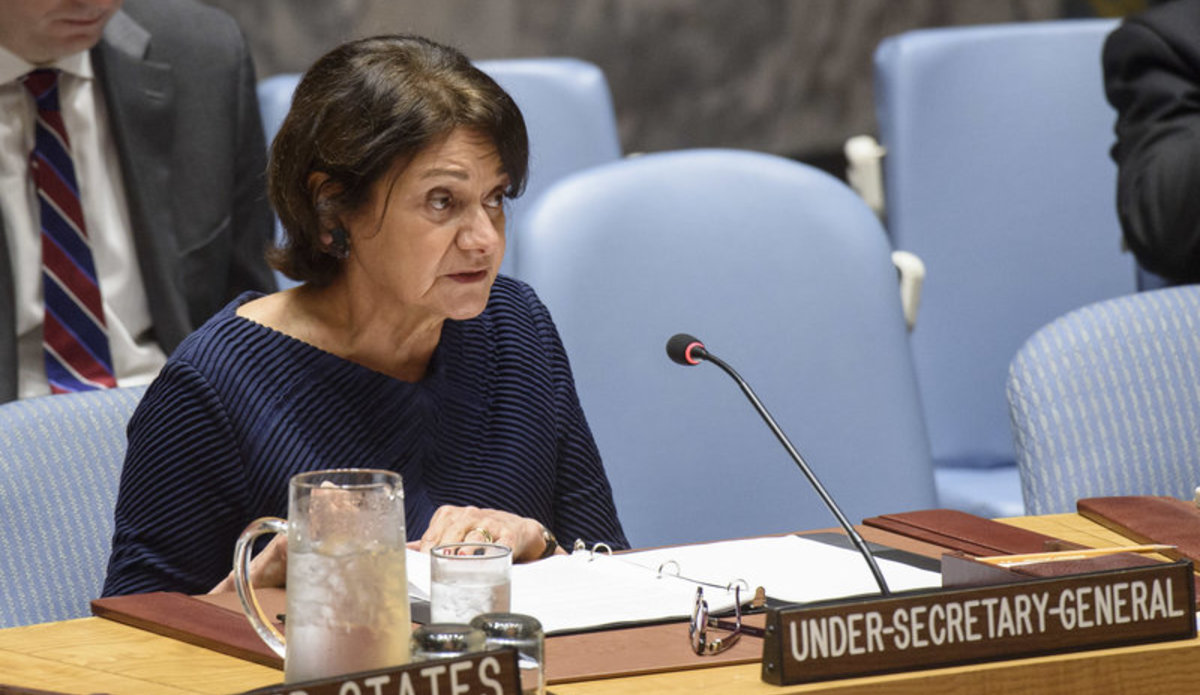Thank you, Mr. President,
The last Security Council meeting on the situation in Ukraine took place five months ago, on 29 May 2018. As I stated then, the UN has been consistent in its strong support for the lead role of the Normandy Four, the Trilateral Contact Group, the OSCE and other key actors to find a peaceful settlement of the conflict in Donbas. The Secretary-General has also repeatedly called for revitalizing efforts in these negotiation formats and bilateral channels. We therefore welcome the Council’s Presidential Statement of 6 June, which encouraged all the parties to recommit to the peace process, recalled the centrality of the Minsk Agreements and urged scaled-up support for humanitarian efforts. We also note the 11 June meeting in the Normandy Format – the first at Ministerial level in over a year.
Despite these efforts, however, there has been little progress in talks to end the fighting. The conflict in eastern Ukraine, now in its fifth year, remains an active threat to international peace and security.
On the ground, continued and unpredictable escalations of hostilities aggravate the climate of insecurity and breed uncertainty about the parties’ intentions. As negotiations on different tracks continue to search for points of convergence, effective implementation of any agreements is still lacking.
It is noteworthy, nonetheless, that the incidence of violence this summer was the lowest of any equivalent period since the conflict broke out in 2014. The so-called “Harvest Ceasefire” and the “Back to School Ceasefire” - two recommitments to the ceasefire negotiated by the Trilateral Contact Group - were instrumental in reducing shelling and fire from small arms and light weapons, in turn resulting in the relatively low, although still tragic, figure of four civilian deaths between 1 June and 31 August. Clearly, with sufficient political will and genuine commitment to agreements, it is possible to stop the violence on the ground and drastically reduce the impact of the conflict on the civilian population.
Regrettably, however, over the last six weeks, ceasefire violations have again increased, and casualty levels have risen. In September alone, OHCHR recorded 20 conflict-related civilian casualties. More than half of the civilian casualties in September were the result of mines or explosive remnants of war.
The UN continues to call upon the parties to ensure the full and immediate implementation of the ceasefire agreements and exercise utmost restraint in order to protect the civilian population in the conflict-affected areas. The priority of the parties should be to, without delay, withdraw heavy weapons from populated areas, disengage forces and protect civilian infrastructure.
The UN is also following reports of increased tensions in the Sea of Azov, which negatively affects the overall atmosphere in the region. We underline the need to avoid any risk of escalation, provocation or miscalculation.
Mr. President,
The Minsk Agreements, endorsed by the Security Council in its resolution 2202 (2015), form the only agreed framework for a negotiated peace in eastern Ukraine.
Echoing the Security Council’s expectations, expressed through the PRST of 6 June, the UN calls for swift progress in the implementation of the Minsk Agreements.
We welcome the most recent extension by the Ukrainian Parliament, on 4 October, of the law on special order regarding the local governance of certain areas of Donetsk and Luhansk regions, consistent with Ukraine’s commitments under the Minsk Agreements.
Mr. President,
The UN urges all parties to avoid any unilateral steps that could deepen the divide or depart from of the spirit and letter of the Minsk Agreements.
On 7 September, the de-facto entities in Donetsk and Luhansk announced the holding of so-called “leadership” elections scheduled for 11 November. Despite Ukraine’s objections, media report that preparations are still going ahead. As we understand, two separate ballots in both Donetsk and Luhansk are reportedly being planned: one for the “Head of Republic” and one for the “People’s Councils”. These will reportedly be voted in for terms of five years.
I wish to recall that election-related matters are addressed in the Minsk Agreements as part of a comprehensive package and they are under consideration in the existing negotiating mechanisms. I therefore caution that any such measures, taken outside Ukraine’s constitutional and legal framework, would be incompatible with the Minsk Agreements.
Mr. President,
On this occasion, I wish to acknowledge the tireless work of the OSCE Special Monitoring Mission on the ground in the face of extremely challenging conditions. I reiterate our call for all to ensure the safety and freedom of movement of the monitors.
As you will hear from ASG Mueller, the human cost of the conflict for the people of Donbas continues to rise. The UN spares no efforts to fulfil its responsibilities in the delivery of humanitarian assistance and the monitoring of human rights. It is essential, however, that this role is not politicized or instrumentalized by any side.
Mr. President,
It is time for renewed and constructive action by all concerned to overcome the apparent impasse in diplomatic negotiations.
The UN underlines the need to fully respect the sovereignty and territorial integrity of Ukraine, within its internationally recognized borders, in accordance with relevant General Assembly and Security Council resolutions. Once again, we urge all parties to display the necessary political will and to recommit to the full implementation of the Minsk Agreements to ensure the earliest possible end to the conflict and help bring about peace and stability to all of Ukraine.
Thank you.

